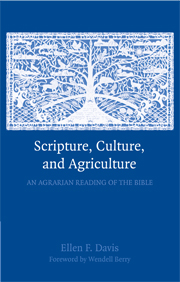Book contents
- Frontmatter
- Contents
- Foreword by Wendell Berry
- Acknowledgments
- Abbreviations
- Introduction
- 1 Rupture and Re-membering
- 2 Reading the Bible Through Agrarian Eyes
- 3 Seeing with God: Israel's Poem of Creation
- 4 Leaving Egypt Behind: Embracing the Wilderness Economy
- 5 A Wholesome Materiality: Reading Leviticus
- 6 Covenantal Economics: The Biblical Case for a Local Economy
- 7 Running on Poetry: The Agrarian Prophets
- 8 Wisdom or Sloth? The Character of Work
- 9 The Faithful City
- Postscript
- Notes
- Scripture Index
- Index
Foreword by Wendell Berry
Published online by Cambridge University Press: 05 June 2012
- Frontmatter
- Contents
- Foreword by Wendell Berry
- Acknowledgments
- Abbreviations
- Introduction
- 1 Rupture and Re-membering
- 2 Reading the Bible Through Agrarian Eyes
- 3 Seeing with God: Israel's Poem of Creation
- 4 Leaving Egypt Behind: Embracing the Wilderness Economy
- 5 A Wholesome Materiality: Reading Leviticus
- 6 Covenantal Economics: The Biblical Case for a Local Economy
- 7 Running on Poetry: The Agrarian Prophets
- 8 Wisdom or Sloth? The Character of Work
- 9 The Faithful City
- Postscript
- Notes
- Scripture Index
- Index
Summary
This book will be welcomed gladly by readers interested in the Bible's sense of our economic life and our ecological responsibilities. Reading it is a pleasure and a help. Ellen Davis's premise is that “the message of the earliest prophetic writers of the Bible was distinctly ‘agrarian.’” Her supporting argument is learned, perceptive, meticulously detailed, and, to my mind, utterly convincing. Professor Davis, moreover, offers her book as a part of the present and ongoing “agrarian conversation” among some writers, some scientists, and the multitude of patriotic citizens now working to build or rebuild local economies of food and farming.
The human situation, as understood by both biblical agrarians and contemporary ones, is about as follows. We are, howbeit only in part, earthly creatures. We have been given the earth to live, not on, but with and from, and only on the condition that we care properly for it. We did not make it, and we know little about it. In fact, we don't, and will never, know enough about it to make our survival sure or our lives carefree. Our relation to our land will always remain, to a significant extent, mysterious. Therefore, our use of it must be determined more by reverence and humility, by local memory and affection, than by the knowledge that we now call “objective” or “scientific.” Above all, we must not damage it permanently or compromise its natural means of sustaining itself.
- Type
- Chapter
- Information
- Scripture, Culture, and AgricultureAn Agrarian Reading of the Bible, pp. ix - xivPublisher: Cambridge University PressPrint publication year: 2008



